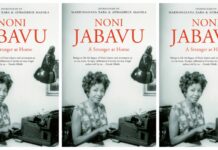Naledi Yaziyo reflects on the joy of the chaos that came with growing up in a single-mother household.
“Hush, your father is sleeping!”
“I don’t know, ask your father when he gets home.”
“Don’t eat that, it’s your father’s”
My aunts and I never heard these words in our childhood home. We heard them at other children’s houses, people who had brooding fathers who made rooms grow quiet. We, of course, did not have a father. Ours was a household run by three girls and their mother. My grandfather had left the family in 1995 to join our ancestors. My teenaged uncles moved from the family home soon thereafter to live with male relatives.
Compared to our friends’ homes there was an element of chaos in my grandmother’s house. We spoke to one another a lot, sometimes in raised voices – like when my pre-teen aunts fought to determine whose turn it was to cook or wash the dishes. We laughed to our hearts content, mostly because my grandmother had a mischievous streak.
She has always distrusted the idea of the bosom buddy, so she had very few friends. I think that when her husband passed, pranking us became one of the ways she overcame the loneliness. When we finally figured out the joke we would collapse on each other with laughter until we heard her put on her most admonishing adult voice and ask “Nihleka ntoni?” The question stopped the laughter in our throats and we would compose ourselves only to realise that her “What are you laughing at?” was yet another prank before she herself burst into a fit of laughter. We would resume the giggles and vow to get her next time.
It was when we traveled to the Eastern Cape for holidays that I would not recognise my grandmother. To this day, she changes very quickly as soon as we enter Cofimvaba. She is less willing to laugh, less willing to tease and play. She is a mother in a way I cannot recognise and demands the strictest kind of respect from us. The way we address her is a little less casual, she is not Ntombi or Ntombendala (old girl), we must address her as an adult.
There is an orderliness to our home in the Eastern Cape that reminds me of the feeling as a child when I visited homes with fathers. Homes with fathers made me nervous, especially if I was meant to be sleeping over. Fathers seemed so large. They took up space and everything in the household seemed to revolve around their taste and preferences. Fathers ate special pieces of chicken, they needed silence, and wielded their authority and approval.
I craved that approval as a child, the way my friends sometimes stood in front of fathers with their report cards ready to be worshipped and praised in their clan names.
Friends who grew up in nuclear families tend to have a firm grasp on this later aspect of my relationship to their father-filled homes; they understand my longing. In fact, they expect it and seem genuinely perplexed when I tell them about the joy of the chaos in a single-mother household. They see only the possibility of tyranny as the worn-out single mother struggles with the weight of the sacrifices she must make in order to uphold a life for her children.
To be fair there is plenty of that too. I am intimately acquainted with the tyranny of iinerves: an affliction that sometimes visits the Xhosa single mother.
You come home from school to find her curled up in her room. She commands you to silence because she has “nerves.” You don’t know what that means but you feel the greyness of the room and know that you must play outside a little longer today to avoid the inevitable shouting should you turn the TV on a little too loud. There are other children outside, playmates whose mothers also have nerves and you know this because they stay out with you right up until dark. Iinerves means you must make sure you are home in time to switch on the lights, that you know what will be served for supper.
Those days do not last however and before you know it the laughter returns and conversation flows. The tyranny lasts a day or two but friends from nuclear families looking in tend to hold on to this single story of the catastrophe of the single mother household. Indeed, there are families where the nerves never leave and children never return from play time. That is one story and we have all heard it plenty.
However, there is another story of the single-mother household, one that hints at the possibility of the single-mother household being another kind of family instead of a story of absence and failure to be nuclear. It hints at the possibility of raising daughters who don’t hold society’s script for relating with men at the ready because those chapters were not prescribed for them. It opens possibilities for raising girls who laugh loud and long, who tease and play and curl up in bed when the world hurts them because they have no shame in feeling pain. This is the aspect of the single-mother household I have come to cherish most, the anarchy of it that gives you plenty of room to find your voice and to test it in the safety of your own home.
My aunts and I still laugh whenever we trade stories of wives and children who tiptoe around fathers. My oldest aunt, the consummate impersonator, puts on a hilarious pleading voice that makes the exaggerated deference to father sound absurd. For indeed it is absurd to one who was never raised to save the best piece of chicken for utata.
The views expressed in this article are the author’s own and do not necessarily reflect The Daily Vox’s editorial policy.
Naledi Yaziyo has spent a substantive portion of her life chasing scholarships, loans and bursaries so she could at least pass for a coconut or one-who-was-born-in-exile. She is currently battling a case of impostor syndrome at Duke University where she is on a Fulbright Scholarship. Her interests vary but girlhood is her latest fascination and she would like to do more critical thinking about black childhood.









